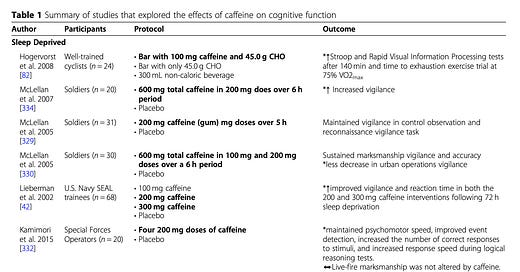Caffeine and exercise performance (30 page study summary)
Welcome to Grappling Lane #9!
This week’s issue is all about caffeine and exercise performance, based on the research provided by the international society of sports nutrition.
This edition touched on:
Caffeine timing
Caffeine side effects
Factors that affect how much we feel the effects of caffeine
Caffeine for cognitive enhancement
If you don’t want to go out tonight, here’s the full 30-page paper.
Let’s go 👊
In the early days (1900s) of modern sport, concoctions of plant-based stimulants, including caffeine and other compounds such as cocaine, strychnine, ether, heroin and nitroglycerin, were developed secretly by trainers, athletes and coaches, in what appears to be evidence for early day ergogenic aids designed to provide a competitive advantage
About caffeine, from smarter people than me
Caffeine improves physical performance in both trained and untrained individuals, especially in the aerobic endurance area. It has consistently been shown to improve endurance by 2-4% across dozens of studies.
3-6mg/kg body mass seems to be the sweet spot for optimal performance. An average espresso shot is 64mg of caffeine. That’s between 240mg and 480mg of caffeine a day. The FDA recommends at most 400mg for a healthy individual. At 9mg/kg, side effects are discussed a lot, without much of the benefits.
Like the previous article on hydration, the actual effect one is feeling from caffeine (from being hyped up all the way to adverse effects on sleep and anxiety) can be associated with the way each individual’s body processes caffeine and how often.
The authors concluded that inter-individual differences in response to caffeine might be responsible for the lack of overall performance improvement, as 50% of subjects improved while 50% worsened, in the caffeine compared to the placebo trial.
Caffeine absorption from food and beverages does not seem to be dependent on age, gender, genetics or disease, or the consumption of drugs, alcohol or nicotine. However, the rates of caffeine metabolism and breakdown appear to differ between individuals through both environmental and genetic influences.
Caffeine doesn’t have to come in the form of coffee. Energy drinks, pre-workout supplements, chewing gum, energy gels and chews are also valid caffeine sources that have been proven to enhance performance.
Chewing gum seems to be the fastest way to get caffeinated. (as the release of caffeine from chewing can be absorbed via the buccal cavity, which is considered faster because it is better vascularized). Although the absorption is faster, the effect is not stronger. (this is only useful for purposes where there is a requirement for rapid and maintained stimulation over a specific period of time)
The impact of temperature and rate of ingestion has been investigated, as people were concerned that cold drinks might pose a danger when chugged compared to hot coffee. One study concluded that although the rate of consumption, temperature and source might be associated with slight differences, these differences are not significant.
The caffeine placebo is strong. A lot of people can anecdotally reference how caffeine works for them, and it seems like the perception someone has about the way caffeine affects them has implications for how they actually feel.
On cognitive enhancement
In a study about caffeine done with Navy Seals, sleep deprivation and cognitive-heavy tasks, it was suggested that smaller, successive doses of caffeine are more beneficial than large boluses, for improving focus and vigilance.
Caffeine timing
The most common timing of caffeine supplementation is 60 min before exercise under the form of coffee.
However, caffeine appears to be most beneficial during times or in sports where there is an accumulation of fatigue, i.e., exercise over a longer continuous or intermittent duration.
Therefore, ingestion of caffeine during exercise (mid/ later stages) may be more beneficial than ingestion beforehand for some individuals depending upon the length of the event.
The optimal timing of caffeine ingestion may depend on the source of caffeine. As stated earlier, some of the alternate sources of caffeine such as caffeine chewing gums may absorb more quickly than caffeine ingested in caffeine-containing capsules.
Reported side effects
Some of the most commonly reported side-effects in the literature are tachycardia and heart palpitations, anxiety, headaches as well as decreased sleep quality.
Increased jitters/anxiety/arousal associated with caffeine ingestion also needs to be considered within the specific demands of each sport, and even the position within a given sport.
For example, athletes competing in sports that heavily rely on the skill component (e.g., tennis players, biathlon shooting) would likely not benefit from caffeine-induced jitters and arousal.
However, athletes in sports that depend more on physical capabilities, such as strength and endurance (e.g., football lineman), might actually benefit from increased jitters and arousal before games.
The primary determinant in the incidence and severity of side-effects associated with caffeine ingestion is the dose used. Side-effects with caffeine seem to increase linearly with the dose ingested.
Wrapping it up
In summary, although reviews of the literature show that caffeine ingestion is, on average, ergogenic for a wide range of sport-specific tasks, its use might not be appropriate for every athlete.
Specifically, the use of caffeine needs to be balanced with the associated side effects and therefore experimentation is required in order to determine the individual response before assessing whether the benefits outweigh the costs for the athlete.
Athletes should gauge their physical response to caffeine during sport practice and competition in addition to monitoring mood state and potentially disrupted sleep patterns.
A question
Hey 👋 welcome everyone who subscribed from the previous issue on rehydration
I plan on posting weekly, but I want to make sure that the content is useful. Everyone’s inboxes get full of spam and offers and I’d like as many people who share similar interests to look forward to this.
Could you do me a favour? Reply to this email and let me know what you would like me to research in-depth for future versions.
Other stuff online
Another awesome video from Patrick Gavia about the Diaz brothers:




